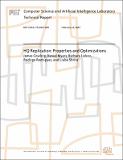HQ Replication: Properties and Optimizations
Author(s)
Cowling, James; Myers, Daniel; Liskov, Barbara; Rodrigues, Rodrigo; Shrira, Liuba
DownloadMIT-CSAIL-TR-2007-009.ps (14985Kb)
Additional downloads
Other Contributors
Programming Methodology
Advisor
Barbara Liskov
Metadata
Show full item recordAbstract
There are currently two approaches to providing Byzantine-fault-tolerant state machine replication: a replica-based approach, e.g., BFT, that uses communication between replicas to agree on a proposed ordering of requests, and a quorum-based approach, such as Q/U, in which clients contact replicas directly to optimistically execute operations. Both approaches have shortcomings: the quadratic cost of inter-replica communication is unnecessary when there is no contention, and Q/U requires a large number of replicas and performs poorly under contention.We present HQ, a hybrid Byzantine-fault-tolerant state machine replication protocol that overcomes these problems. HQ employs a lightweight quorum-based protocol when there is no contention, but uses BFT to resolve contention when it arises. Furthermore, HQ uses only 3f+1 replicas to tolerate f faults, providing optimal resilience to node failures.We implemented a prototype of HQ, and we compare its performance to BFT and Q/U analytically and experimentally. Additionally, in this work we use a new implementation of BFT designed to scale as the number of faults increases. Our results show that both HQ and our new implementation of BFT scale as f increases; additionally our hybrid approach of using BFT to handle contention works well.
Date issued
2007-02-12Other identifiers
MIT-CSAIL-TR-2007-009
Series/Report no.
Massachusetts Institute of Technology Computer Science and Artificial Intelligence Laboratory